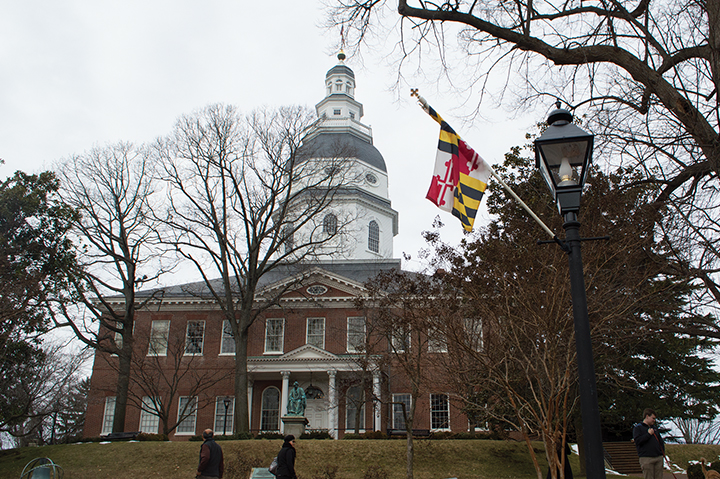By Lexie Schapitl and Michael Brice-Saddler
Senior staff writers
A state Senate committee heard testimony Wednesday on the Student Debt Relief Act — Gov. Larry Hogan’s initiative to provide tax deductions to Marylanders struggling to pay off student loans.
The act would allow individuals making less than $200,000 a year and couples making less than a combined $250,000 a year to deduct 100 percent of interest paid on their student loan debt from their state income taxes. The proposal would save Marylanders $20 million a year, according to the governor’s office.
Cassie Shirk, a special assistant in Hogan’s legislative office, told the Senate Budget and Taxation Committee Wednesday the act would help state residents pay off their college loans at a time when earning a college education is more important than ever.
“By 2020 nearly 70 percent of the jobs in Maryland will require a college degree,” she said. “But the harsh reality that many students face is that earning a college education goes hand-in-hand with accumulating student debt.”
The average borrower in Maryland has $27,687 in student loan debt, ranking this state 24th in the nation, according to a LendEDU report released Thursday. Fifty seven percent of graduates in the state leave school with student debt, and the student loan default rate — when a student doesn’t pay their loans on time — is 5.29 percent, the report found.
Nationally, 44 million Americans are working to repay student debt, according to the report.
While Marylanders can currently receive federal deductions of up to $2,500 annually on their student loan interest, Hogan’s bill would expand those benefits to reach more state residents, said Heidi Dudderar, a deputy legislative officer in the governor’s office. The federal deduction phases out for individuals making $65,000 to $80,000 a year and is eliminated at $80,000; it also phases out for couples making $130,000 to $160,000 and is eliminated at $160,000, Dudderar said. Some Marylanders may also pay more than $2,500 in loan interest each year, or they may not qualify for federal deductions if they are claimed as dependents, she added.
Individuals must earn a bachelor’s or graduate-level degree to qualify for the deduction. Sen. Rich Madaleno (D-Montgomery County) asked Hogan’s representatives Wednesday why the bill’s definition of a higher education institution did not include community colleges.
Shirk said this was “an oversight on our part.”
“It wasn’t our intention to exclude community colleges,” she said. “If we could amend the bill to make sure that community colleges are included, that would be amenable.”
Michael Sanderson, the executive director of the Maryland Association of Counties also suggested providing a tax credit rather than a tax deduction, stating the former would give this state “more bang for the buck.” While a tax deduction reduces how much taxable income you have, a tax credit directly reduces how much tax you owe.
Because many Marylanders already qualify for deductions on student loans, Sanderson said they would only receive half the benefit of the state’s act. As a practical matter, a tax credit would reach more residents with student debt, especially lower-income individuals, Sanderson said.
“That way everybody gets the full benefit,” he said. “… It may raise your fiscal note a little bit, but I think you reach the people you want to reach.”
Matt Williams, a student from the University of Maryland University College, called Hogan’s initiative a “bold proposal” to help students and families throughout the state.
“When you’re dealing with a bunch of people who literally live paycheck to paycheck while they’re trying to get started in their lives and get self-sufficient in their jobs, every little bit helps,” Williams said.
Hogan announced his student debt act at a Jan. 10 press conference at the University of Maryland. He also announced a plan to cap tuition increases at University System of Maryland institutions at 2 percent, saying his administration’s “top priority has been and will continue to be education,” including higher education.
System Chancellor Robert Caret said at the press conference he hopes the assembly passes Hogan’s initiatives.
“Obviously, the governor is very, very committed to keeping the cost down for students, and hence, hopefully decreasing debt as part of that,” he said.
The House of Delegates’ Ways and Means Committee heard testimony on the Student Debt Relief Act on Feb. 15. Each committee will now submit a favorable or unfavorable report on the bill before the bill returns to the full house chambers.



